Saint George Travel Guide
Saint George (often called St. George's, a confusion with the parish it is in) is the second town and former capital of Bermuda. Saint George is described as the oldest, continually inhabited English settlement in the New World. It was founded in 1612 and served as the capital of Bermuda until eclipsed by Hamilton in 1815. Because of a shift of business and government to Hamilton, Saint George did not have its streets and buildings demolished and rebuilt, as in Hamilton, and so looks very much as it did 250 years ago. In fact, because of its many heritage buildings, it was declared a UNESCO World Heritage Site during the 1990s.
Due to its status as a World Heritage Site, there are many fine old colonial streets and buildings for visitors to explore; streets and alleys with fanciful names such as 'Featherbed Alley', 'Old Maid's Lane', 'Silk Alley' and 'Needle and Thread Alley'. However, the best thing to do upon arrival in the town is head for the main King's Square.
King's Square was the original main square of Saint George, home to the Town Hall, the Visitor's Service Bureau and Ordinance Island across a small bridge directly to the south. During the tourist season (from May to September), actors in period dress provide colour to the community acting as town criers or sentencing men or women to the stockades, pillories or the dunking chair. Getting to this charming little town is easy, as Saint George is accessible directly from Hamilton by bus, and from the rest of the islands by changing buses in Hamilton, or by use of taxis.
Things to do in Saint George
Historic Saint George and its related fortifications are now a World Heritage Site designated by UNESCO. The architecturally rich, 400 year old town joins such select sites as the Great Wall of China, Statue of Liberty, Taj Mahal, and historic centre of Florence. The town is a delightful one in which to walk around. It has many narrow lanes leading away from the harbour, which were originally the footpaths to the houses. The dwellings are picturesque with their well maintained gardens, coloured by banana and paw-paw trees. There are horse-drawn buggy rides as a means of transport and a bus service runs to locations of interest such as Clearwater Beach, St David's Island and Fort St Catherine.
St George is located at the east end of the country and provides a pleasant and relaxed day's sightseeing. There is a slide show on the Parish, which may be of interest to visitors. A walking tour is a good way to explore the museums and quaint shops and one can meet the Town Crier along the way whilst stopping here and there to sample the fare at the charming restaurants.
The hub of town life is King's Square, featuring stocks, a pillory and a whipping-post where criminals were punished in days of yore. The Town Crier appears here on occasion, in traditional costume, to re-enact scenes such as committing the town drunk to the stocks and securing the town gossip on the Ordnance Island ducking stool. The Town Hall fronts the square, and behind it is one of Bermuda's oldest buildings, the State House, dating from 1619. Located close to this are art galleries and several museums. The Visitor's Service Bureau supplies maps and brochures about the town and provides an excellent walking tour of the old town.
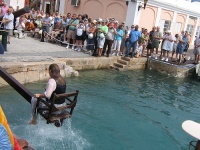
King's Square
Many attractions are located around King's Square where a beautiful 18th century town hall overlooks the old pillory and stocks. The hall is no longer in use but does provide great photo opportunities. Located close by is the dunking stool where gossips and petty offenders were forced to endure the humiliation of being dunked in the harbour. A few minutes walk from here is the Old State House, Bermuda's first all-stone structure and oldest building, dating to 1620. Originally known as Sessions House, it was the first permanent home of the colonial assembly, which until then, had held their debates in St Peter's Church.
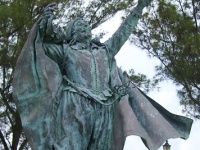
Somers's Garden
Located North of King's Square is Somers Garden, named after the colony's founder whose ship, , was wrecked off the island in 1609. Finding it a fairly nice place to be washed ashore, Sir George Somers built a replacement vessel from the local cedar, left some sailors behind to establish British claim to the islands and then headed home. He returned within the year but died shortly after arrival, leaving his heart, quite literally, on the island (his vital organs and entrails are in a small tomb in the Garden). The rest of his body, however, was sent back to England, as was customary at the time.
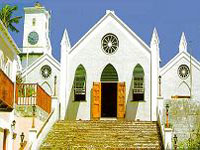
St Peter's Church
St Peter's Church is one of Bermuda's most cherished landmarks, and the oldest Anglican Church outside Britain. The original wooden structure was built in 1612 and its roof is thatched with palmetto. Among St Peter's many treasures are a mahogany altar, the St George's chalice that was presented in 1625, a Bible from 1594, Charles I silver, open cedar timber beams, beautiful chandeliers, and marble memorials to some of the Island's earliest governors. St Peter's served as the only public meeting place in Bermuda until the State House was built. The churchyard is also well worth walking around in, with tombstones telling stories of epidemics, shipwrecks and war.
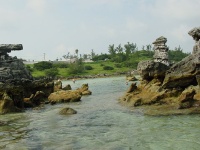
Somers's Wharf
Somers Wharf is steeped in the varied and vibrant history of St. George's. The Wharf has commanded a bird's-eye view of the Old Town's fascinating maritime past, situated on the picturesque edge of St George's Harbour. Today, Somers's Wharf is a tastefully redeveloped area on the waterfront with a selection of shops and restaurants. The Carriage Museum has a collection of well-maintained carriages ranging from a dog-cart to a four-horse brake that ruled the roads until as recently as 1946 when cars were legalized. Situated nearby is Tobacco Bay, a good spot for swimming and snorkeling.
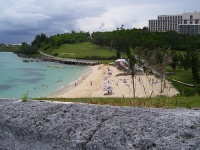
Fort St Catherine
On the northern tip of St George's Island is Fort St Catherine, overlooking the beach where Sir George Somers and his shipwrecked crew came ashore in 1609. Bermuda's first governor, Richard Moore, who was a carpenter by trade, built a wooden fort on this site several years later. Today it is a massive fortification complete with a moat, drawbridge, ramparts and a maze of tunnels. Fort St Catherine is now used as a museum containing period weapons, colourful dioramas, a wax figure of Queen Elizabeth II, and replicas of Britain's crown jewels. An audiovisual presentation focuses on the many forts located around Bermuda.
Bermuda travel info
Electricity
Electrical current is 110 volts, 60Hz. US flat, two-pin plugs are used. Power outages and surges are common, as a result visitors should bring surge protectors for the safety of their devices.
Language
English is the official language.
Money
The Bermudan Dollar (BMD) is divided into 100 cents, and is tied to the US Dollar (US$1=BD$1). US currency is accepted almost everywhere and other major currencies can be exchanged at banks and bureaux de change. Banking hours vary, though most are open weekdays from 9am to 4.30pm. Visa, MasterCard and American Express are widely accepted and ATMs are easily available. Visitors are advised to exchange all their Bermudan Dollars before leaving, as it is impossible to exchange once outside the country.
Tipping
If not included in the bill, a 15 percent tip is generally expected at restaurants and hotels. Taxi drivers are usually tipped 10 percent, and all Bermuda hotels add a hotel tax of 10 percent to the bill at check-out.
Health
There are no specific health risks for visitors to Bermuda and medical care is of a high standard. Health insurance is recommended, as medical treatment is expensive. Food and water are considered safe for consumption.
Safety
Bermuda is relatively crime-free but visitors should exercise the necessary precautions to safeguard personal possessions. Care should be taken after dark, avoiding quieter, poorly lit streets in particular. Hurricane season normally runs from June to November.
Local customs
As a general rule, dress conservatively. Bathing suits are acceptable only on the beach, and it is considered an offence to appear in public without a shirt. Casual sportswear can be worn in restaurants during the day, but in the evening men should dress more formally with slacks and a shirt. Good manners are expected, and asking a question without first offering a proper greeting is considered extremely rude. Nude or semi-nude bathing is not permitted in Bermuda.
Doing business
Bermuda's economy is dominated by tourism and international financial services. Business etiquette is conservative, and businessmen and women should stick to formal dress or lightweight suits. For meetings, punctuality is important, people are greeted with handshakes, and business cards are exchanged. Business hours are generally 9am to 5pm Monday to Friday.
Duty free
Travellers to Bermuda over 18 years do not have to pay duty on 200 cigarettes, 50 cigars and 500g tobacco; and 1 litre liquor and 1 litre wine. However, duties may have to be paid on perfume and certain gifts. Spearguns are prohibited.
Communications
The international access code for Bermuda is +1, in common with the US, Canada and most of the Caribbean, followed by 441. The outgoing code is 011 followed by the relevant country code (e.g. 01144 for the United Kingdom); no outgoing code is needed to call the US. Mobile phones operate on a GSM 1900 network. Free wifi is widely available in restaurants, pubs and other tourist areas.
Passport & Visa
All visitors must hold a return or onward ticket and any documents required for further travel, as well as a valid passport. We recommend that passports be valid for six months after arrival at destination. As part of the Western Hemisphere Travel Initiative (WHTI), all travellers travelling between the United States and Canada, Mexico, Bermuda, and the Caribbean region are required to present a passport or other valid travel document to enter or re-enter the United States. If departing from the USA, a valid passport will be required by immigration authorities. Visa requirements vary according to country.
Entry requirements
United States nationals must have a passport that is valid upon arrival, but a visa is not required.
UK nationals require a passport that is valid for the duration of their stay, and it must have space for entry and exit stamps. They can visit without a visa for up to 180 days in any 12-month period, but must have a ticket for return or onward travel.
Canadian nationals need a passport that is valid for at least 45 days beyond the date of expected departure from Bermuda, and a visa is not required.
Australian nationals need a passport that is valid upon arrival, but a visa is not required.
South African nationals require both a visa and a valid passport for entry to Bermuda. Passports should be valid for at least 45 days beyond the intended period of stay.
Irish nationals must have a passport that is valid upon arrival, but they do not need a visa.
New Zealanders must have a passport that is valid upon arrival, but they do not need a visa.
Useful contacts
Bermuda Department of Tourism, Hamilton: +1 441 292 0023 or www.gotobermuda.com.
Emergencies: 911 (ambulance, fire, police, and marine).


